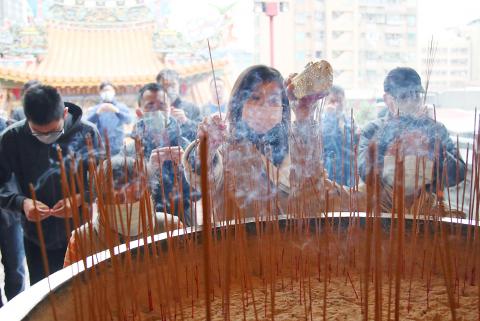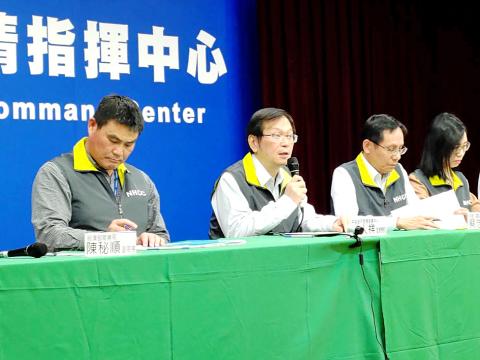The Central Epidemic Command Center yesterday confirmed three new cases of 2019 novel coronavirus (2019-nCoV) infection in Taiwan — two Chinese visitors from the Chinese city of Wuhan, where the virus was first discovered, and one Taiwanese spouse of a previously confirmed case.
The command center also raised its travel advisory for China, excluding Hong Kong and Macau, to level 3, its highest warning level, meaning people should avoid unnecessary travel to the area, Centers for Disease Control (CDC) Deputy Director-General Chuang Jen-hsiang (莊人祥) said.
Yesterday’s announcement raised the total number of cases of 2019-nCoV confirmed in Taiwan to eight, with the latest being the husband of the fifth case reported on Monday.

Photo: CNA
The man had not visited China, making it the first indigenous case of the 2019-nCoV infection, the command center said.
Minister of Health and Welfare Chen Shih-chung (陳時中) said the command center would enhance the health monitoring mechanism by providing electronic devices for people under home quarantine, including those who had returned from Wuhan and those who have had direct contact with confirmed patients, to report back to health departments daily, starting today.
The decision to raise the level of the travel advisory to China was made following a WHO report published late on Sunday that said the risk of the 2019-nCoV outbreak is “very high” in China, Chuang said.

Photo: Wu Liang-yi, Taipei Times
The US’ Centers for Disease Control and Prevention has also raised its travel advisory to level three — meaning people should “reconsider travel” to China, he added.
“Cases of 2019-nCov infection have been confirmed in every province in China except for Tibet, and the number of cases have continued to increase, signifying a serious epidemic,” Chuang said.
The two new imported cases in Taiwan are two female Chinese visitors in their 70s from Wuhan, who came to Taiwan on Wednesday last week.
The two women felt ill and sought treatment at a hospital on Saturday last week and they were immediately placed in negative pressure isolation wards and reported to the CDC as potential cases of 2019-nCoV, he said.
Their test results yesterday came out positive for the new virus, he said.
The two do not have pneumonia and are in stable condition, he said, adding that the hospital and local health bureaus are taking standard procedures in treatment and follow-up investigations on people who have had direct contact with them.
The command center on Monday received 130 reports of severe pneumonia with novel pathogens, bringing the total number of suspected cases to 530 in Taiwan.
Among them, eight were confirmed to have the virus, 269 people were ruled out and the remainder are under quarantine for further examinations, including 98 who had negative results in their first test.
Among the 470 people who have had direct exposure to the first five confirmed cases in the nation and are under medical monitoring, 16 exhibited symptoms of the disease, of which 10 returned negative results in two tests for the virus, while the other six are still under examination.
The Ministry of Economic Affairs’ Department of Commerce deputy head Chen Mi-shun (陳秘順) said that from yesterday to tomorrow, the Ministry of Health and Welfare is distributing 6 million medical-standard masks per day to pharmacies and convenience stores for public purchase.
“Each person will only be allowed to buy three masks,” he said, adding that the policy is an emergency measure, because mask production was down during the Lunar New Year holiday, which ends today.
Hopefully, production would return to normal after people go back to work tomorrow, he added.
The masks released by the ministry are to be sold for NT$8 apiece and retailers have obtained approval to sell them by piece, he said, urging people not to stockpile masks.

The Taiwanese passport ranked 33rd in a global listing of passports by convenience this month, rising three places from last month’s ranking, but matching its position in January last year. The Henley Passport Index, an international ranking of passports by the number of designations its holder can travel to without a visa, showed that the Taiwan passport enables holders to travel to 139 countries and territories without a visa. Singapore’s passport was ranked the most powerful with visa-free access to 192 destinations out of 227, according to the index published on Tuesday by UK-based migration investment consultancy firm Henley and Partners. Japan’s and

NATIONAL SECURITY THREAT: An official said that Guan Guan’s comments had gone beyond the threshold of free speech, as she advocated for the destruction of the ROC China-born media influencer Guan Guan’s (關關) residency permit has been revoked for repeatedly posting pro-China content that threatens national security, the National Immigration Agency said yesterday. Guan Guan has said many controversial things in her videos posted to Douyin (抖音), including “the red flag will soon be painted all over Taiwan” and “Taiwan is an inseparable part of China,” while expressing hope for expedited “reunification.” The agency received multiple reports alleging that Guan Guan had advocated for armed reunification last year. After investigating, the agency last month issued a notice requiring her to appear and account for her actions. Guan Guan appeared as required,

Japan and the Philippines yesterday signed a defense pact that would allow the tax-free provision of ammunition, fuel, food and other necessities when their forces stage joint training to boost deterrence against China’s growing aggression in the region and to bolster their preparation for natural disasters. Japan has faced increasing political, trade and security tensions with China, which was angered by Japanese Prime Minister Sanae Takaichi’s remark that a Chinese attack on Taiwan would be a survival-threatening situation for Japan, triggering a military response. Japan and the Philippines have also had separate territorial conflicts with Beijing in the East and South China

A strong cold air mass is expected to arrive tonight, bringing a change in weather and a drop in temperature, the Central Weather Administration (CWA) said. The coldest time would be early on Thursday morning, with temperatures in some areas dipping as low as 8°C, it said. Daytime highs yesterday were 22°C to 24°C in northern and eastern Taiwan, and about 25°C to 28°C in the central and southern regions, it said. However, nighttime lows would dip to about 15°C to 16°C in central and northern Taiwan as well as the northeast, and 17°C to 19°C elsewhere, it said. Tropical Storm Nokaen, currently